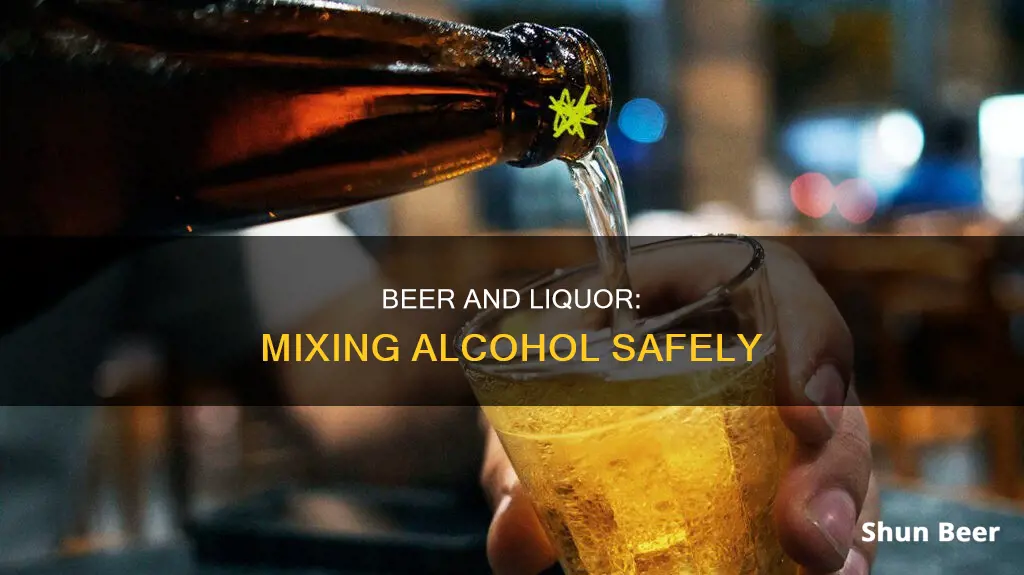
The saying, beer before liquor, never been sicker; liquor before beer, you're in the clear, is a widely popular phrase with unknown origins. It suggests that drinking beer before liquor can worsen hangover symptoms. However, modern research has debunked this myth, concluding that the order of consumption does not influence a person's hangover severity. Instead, the amount of alcohol consumed is the critical factor in determining the risk and intensity of a hangover. While the adage may not hold scientific validity, it is essential to remember that excessive alcohol consumption can lead to negative health consequences. Responsible drinking and moderation are key to minimizing health risks associated with alcohol consumption.
| Characteristics | Values |
|---|---|
| Whether drinking beer before liquor makes you sicker | No |
| Whether drinking liquor before beer makes you sicker | No |
| What causes sickness after drinking | Drinking too much alcohol |
| What can help prevent a hangover | Staying hydrated, drinking in moderation, getting enough sleep, drinking lower-calorie options |
What You'll Learn

The amount of alcohol matters more than the type of drink
The idea that drinking beer before liquor can make you sicker has been debunked by modern research. The popular saying, "beer before liquor, never been sicker; liquor before beer, you're in the clear," is not supported by scientific evidence. The order in which you consume alcoholic beverages does not influence whether you experience a hangover. Instead, it is the total amount of alcohol consumed that matters.
The amount of pure alcohol (ethanol) in a drink is what matters, rather than the drink's alcohol by volume (ABV). For example, a Manhattan cocktail (28% ABV) and a bottle of beer (5-6% ABV) cannot be fairly compared based on their ABVs alone, as the absolute amounts of alcohol consumed are typically different. A beer also takes longer to drink than a cocktail or a shot, resulting in a lower alcohol consumption rate per minute.
Additionally, the way our bodies absorb alcohol differs depending on the preparation. For instance, a 2007 study found that diluted vodka was absorbed faster than vodka served neat. This means that even if the same amount of time is taken to consume the same absolute amount of alcohol, the body may still absorb it differently.
A 2019 study further supported this idea by comparing the hangover severities of subjects who consumed only beer, only wine, beer followed by wine, or wine followed by beer. The results indicated that neither the type nor the order of alcoholic beverages significantly affected hangover intensity.
While the saying "beer before liquor" may have originated from old folk wisdom, it is primarily based on subjective experiences and has little scientific basis. The best way to avoid a hangover is to drink in moderation, stay hydrated, and get plenty of sleep.
Beer and Heart Attacks: What's the Real Deal?
You may want to see also

Carbonated drinks irritate the stomach lining, increasing alcohol absorption
The popular saying, "Beer before liquor, never been sicker; liquor before beer, you're in the clear," is a myth that has been debunked. The order in which you consume alcoholic beverages does not influence whether you experience a hangover. Instead, the total amount of alcohol consumed is the main factor that determines the severity of a hangover.
However, carbonated drinks, such as beer and sparkling wine, can irritate the stomach lining, increasing alcohol absorption. This irritation is caused by the carbonation in these beverages, which introduces air into the stomach, similar to eating or drinking too fast. This can lead to stomach pain, bloating, and gas. Additionally, the carbonation may also be detected by pain receptors in the body, which can register them as pain.
Furthermore, carbonated alcoholic beverages are absorbed more rapidly than those without carbonation. This is because carbonation increases the rate of alcohol absorption in the stomach. As a result, drinking beer before liquor may lead to a higher blood alcohol concentration (BAC) compared to drinking liquor before beer.
It is important to note that individual factors, such as genetics, frequency of drinking, and whether food was consumed alongside the alcohol, also play a role in the absorption and effects of alcohol. While the order of drinking may not directly influence a hangover, starting with liquor and transitioning to beer can help with pacing and lower the overall amount of alcohol consumed.
Beer and Prediabetes: What's Safe to Drink?
You may want to see also

Drinking order is unlikely to influence hangovers
There are many theories about the popular saying, "Beer before liquor, never been sicker; liquor before beer, you're in the clear." One theory suggests that drinking beer before liquor can cause a worse hangover than the other way around. However, the idea that drinking order influences hangovers is just a myth.
Alcohol starts being absorbed into your bloodstream as soon as it reaches your stomach, so the order in which you consume your drinks is unlikely to affect your hangover. Instead, the total amount of alcohol you consume is a more significant factor. If a particular drinking order consistently leads you to drink more alcohol, it may be more likely to cause a hangover.
Other factors that can influence your risk of experiencing a hangover include the amount of alcohol you drink, whether you drink on an empty stomach, how frequently you drink, genetics, congeners, and smoking. To avoid a hangover, it's best to focus on these factors rather than the order of your drinks.
Old Beer: Is It Safe to Drink After a Year?
You may want to see also

Drinking on an empty stomach can worsen side effects
Drinking on an empty stomach can have a significant impact on how your body processes alcohol. Food plays a crucial role in determining how quickly alcohol is absorbed into the bloodstream. When you drink on an empty stomach, the alcohol passes directly into your bloodstream from the small intestine, and the process is faster.
The stomach acts as a gatekeeper, controlling the speed at which alcohol enters the small intestine. A full stomach can prevent alcohol from passing into the small intestine too quickly. On the other hand, an empty stomach allows alcohol to enter the small intestine and be absorbed more rapidly. This is because 80% of the alcohol you consume is absorbed most quickly into the bloodstream through the small intestine.
When alcohol is absorbed too fast, it amplifies the side effects of drinking, impairing your judgment and coordination. Drinking on an empty stomach can make you feel drunk more quickly and increase the severity of hangover symptoms. These symptoms can include nausea, vomiting, abdominal pain, sensitivity to light and sound, headaches, and excessive thirst.
In rare cases, consuming significant amounts of alcohol on an empty stomach can lead to a serious condition called alcoholic ketoacidosis. This occurs when the body's metabolism is disrupted, resulting in severe nausea, vomiting, and abdominal pain. This condition requires hospital treatment.
To avoid the worsened side effects of drinking on an empty stomach, it is recommended to eat before drinking or to sip your drink slowly over an extended period. It is also important to stay hydrated, drink water, and be mindful of the amount and type of alcohol you consume.
Beer and Niacin: What's the Safe Combination?
You may want to see also

Other factors, like genetics, can affect hangover risk
While the order in which you consume alcoholic drinks does not influence whether you experience a hangover, other factors, including genetics, can affect your risk of a hangover.
Genetics plays a significant role in determining hangover risk and severity. Research suggests that as much as 55% of the variability in hangovers can be attributed to genes. This means that your genetic makeup can influence how susceptible you are to experiencing a hangover after consuming alcohol.
Twin studies have been instrumental in understanding the genetic influences on hangovers. By comparing identical and non-identical twins, researchers found that the heritability of hangovers was around 55% in males and 40% in females. These findings indicate that our genes play a substantial role in determining our likelihood of experiencing a hangover.
Additionally, genetics can also impact hangover resistance. The ability to drink alcohol without experiencing a hangover the next day is also influenced by our genes. This is an important finding as it suggests that individuals who need larger amounts of alcohol to feel intoxicated may be at a higher risk for alcohol dependency.
While genetics is a significant factor, it is essential to remember that environmental factors also come into play. Access to alcohol, peer alcohol use, and other factors can contribute to the likelihood of experiencing a hangover.
Therefore, it is safe to say that while the order of drinking beer and liquor may not matter, your genetics and other factors can indeed influence your risk of experiencing a hangover.
Heart Condition and Beer: Is It Safe to Drink?
You may want to see also
Frequently asked questions
Yes, you can drink beer and then liquor. However, drinking too much alcohol, regardless of type or order, can lead to negative consequences such as hangovers and sickness.
To prevent a hangover, it is recommended to stay hydrated, drink in moderation, and get plenty of sleep.
No, the order in which you drink beer and liquor does not affect whether or not you will get sick. The amount of alcohol consumed and individual factors such as genetics, tolerance, and hydration levels play a more significant role.







